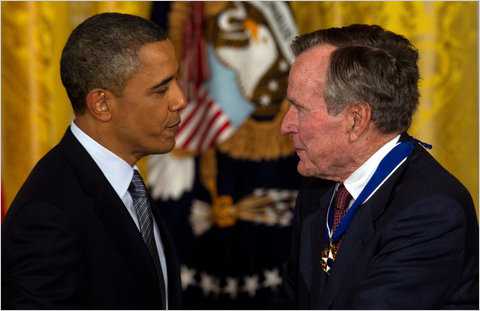
By MICHAEL D. SHEAR
The patriarch of the Bush family dynasty stood in the White House he once led, a bit unsteady but with a large smile on his face, and accepted the nation’s highest civilian honor from President Obama on Tuesday.
In an East Room ceremony, former President George Bush, 86, received the 2010 Medal of Freedom, part of a group of 15 Americans who Mr. Obama hailed for their contributions to the arts, politics, public service, sports and activism.
“His life is a testament that public service is a noble calling,” Mr. Obama said of the 41st president before tying the blue-and-white ribbon and medal around his neck. “Like the remarkable Barbara Bush, his humility and his decency reflects the very best of the American spirit. This is a gentleman.”
The two men — separated by political party and philosophy — shared a knowing glance as Mr. Obama paid homage to what he said was Mr. Bush’s nearly 70 years of service to his country. The president credited Mr. Bush with reducing nuclear weapons, ousting Iraq’s Saddam Hussein from Kuwait and helping to guide the end of the cold war.
“And then, just to cap it off, well into his 80s, he decides to jump out of airplanes,” Mr. Obama said, referring to Mr. Bush’s late-in-life parachute jumping.
Among the perks of the presidency, perhaps none is less controversial or more appealing to the occupant of the Oval Office than the annual role of conferring the Medal of Freedom.
“Now you know why I like this day so much,” Mr. Obama told the audience of invited guests at the end of the event. “I know people try to observe decorum when they are here in the White House. But I’d welcome everybody to stand and acknowledge these extraordinary men and women.”
Among those honored were people who played significant roles in shaping American or global history and culture. Only one is deceased — Tom Little, a humanitarian who was killed by the Taliban in Afghanistan as he helped provide vision care to people there.
Angela Merkel, the chancellor of Germany, was honored by Mr. Obama for being what he called “an inspiration” to people around the world. She did not attend the ceremony, but Mr. Obama said he would present the award to her on her next visit to Washington.
The rest received their awards in person Tuesday afternoon.
Mr. Obama lauded Stan Musial, the baseball legend, by recounting his becoming the first athlete to make $100,000 a year. “Even more shocking,” the president said, “he asked for a pay cut when he didn’t perform up to his own expectations. You can imagine that happening today.”
The president honored Bill Russell, the legendary Boston Celtics basketball player, as “someone who stood up for the rights and dignity of all men,” and the poet Maya Angelou as a “voice that has spoken to millions.”
Among those to receive the award Tuesday from Mr. Obama was one of the world’s richest men, Warren E. Buffett. But the president also lauded those who have worked on behalf of equality for the poor and struggling, including and John J. Sweeney, who for more than a decade led the A.F.L-C.I.O., and Representative John Lewis, Democrat of Georgia, who helped lead the civil rights movement in America.
“Time and again, he faced down death so that all of us could share equally,” Mr. Obama said of Mr. Lewis, whom he called “the conscience of the Congress.”
In addition, the medal went to Yo-Yo Ma, one of the world’s best cellists; Sylvia Mendez, a civil rights activist of Mexican descent; Jean Kennedy Smith, the sister of the former president and the former ambassador to Ireland; Gerda Weissmann Klein, a Holocaust survivor; Jasper Johns, the American artist; and John H. Adams, who co-founded the environmental group National Resources Defense Council.
This post has been revised to reflect the following correction:
Correction: February 15, 2011
An earlier version incorrectly described Jean Kennedy Smith; she is the sister, not the brother, of President Kennedy.
thecaucus.blogs.nytimes.com, February 15, 2011